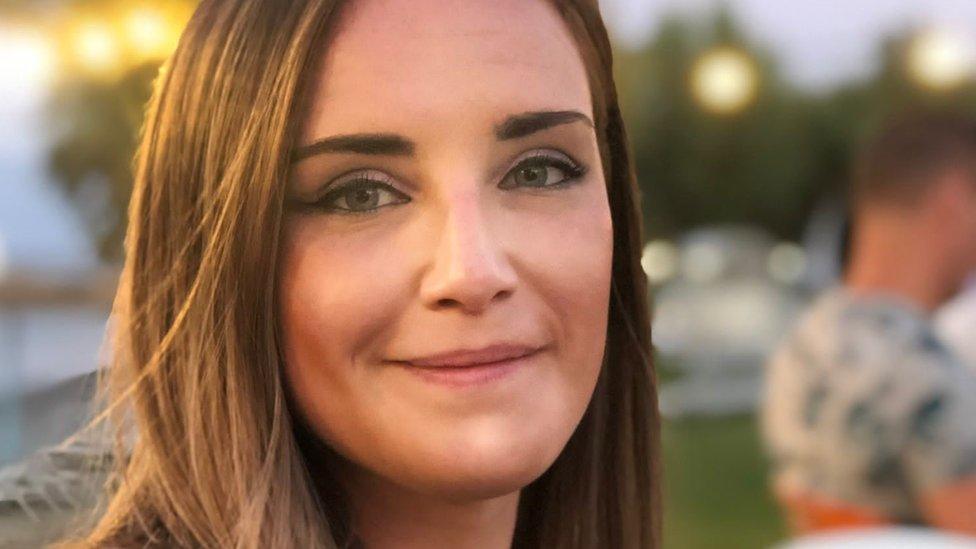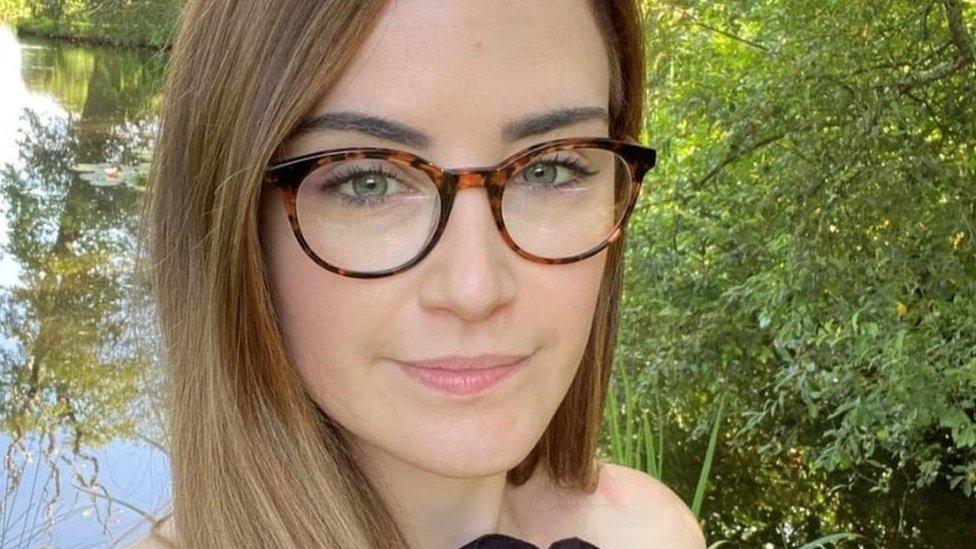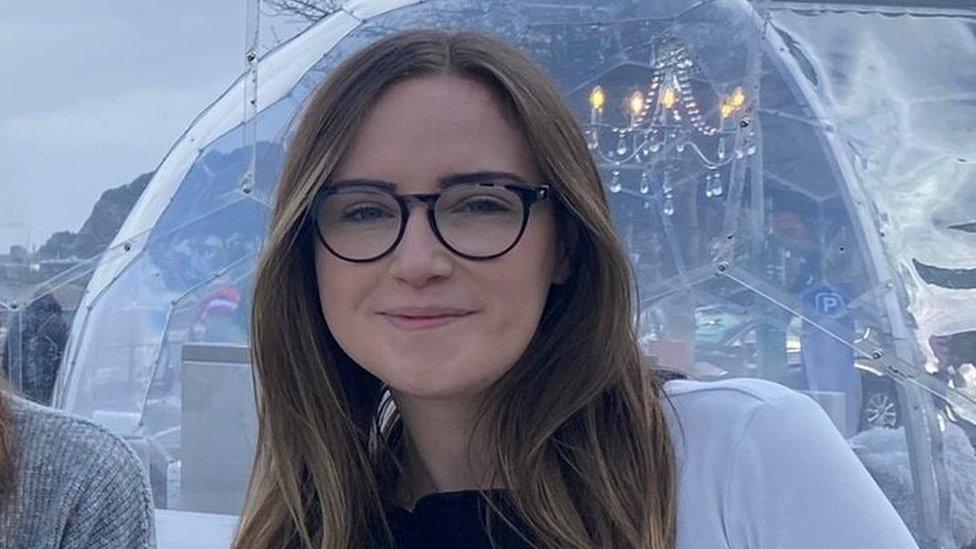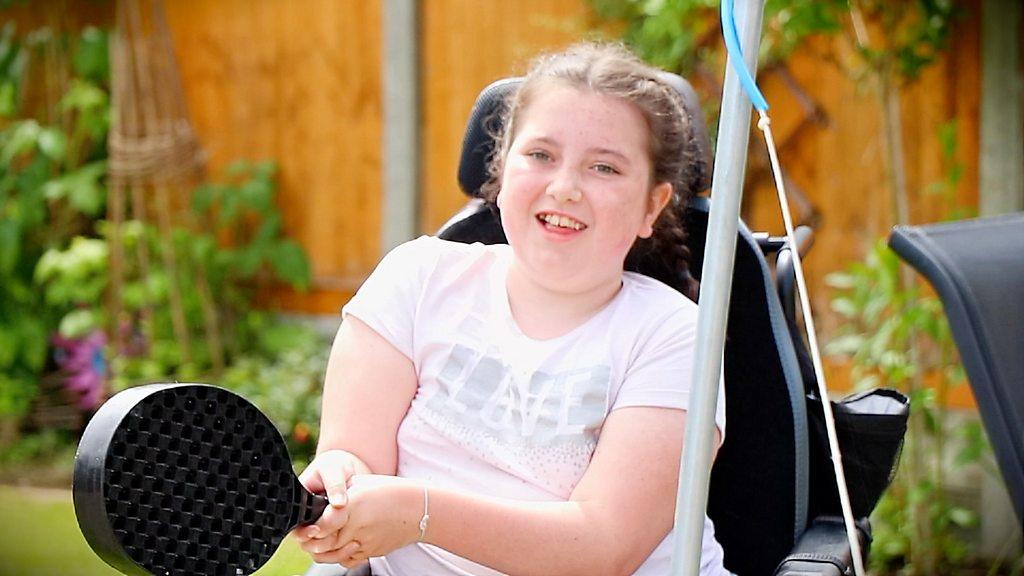Swansea woman waits 17 years for disease diagnosis
- Published

Becky is speaking out about her painful disease and long road to diagnosis during Charcot-Marie-Tooth awareness month
A woman with a little-known neurological disorder says a lack of awareness meant she endured 17 years of pain before a diagnosis.
Despite an estimated 25,000 people in the UK having Charcot-Marie-Tooth disease, external (CMT), Becky Jones said most respond with a "glazed stare" when she tells them about her condition.
CMT causes peripheral nerve damage and is progressive so will worsen with age.
There is a 50% chance of Becky passing on the faulty gene to any children.
Becky, 29, from Swansea, was 10 when she first started having symptoms - painful feet that were constantly cold.
"I would wake up in the morning and my feet would feel so bruised that it was really difficult to put my feet on the floor," she said.
She first went to see her GP about her feet when she was 19 as one of her toes, which was much longer that the others, was curling under itself and making walking painful.
This resulted in her having an operation to shorten the toe but walking remained uncomfortable.

Becky first experienced symptoms when she was 10
After graduating she took a job that involved a lot of typing on a laptop and found her hands became very painful.
She lived with the pain for three years before going to the GP who told her it was carpal tunnel syndrome, external.
But nerve conduction tests then showed damage to her peripheral nerves.
She began doing her own research online and thought CMT fitted her symptoms but it was another two years following a lumbar puncture, external, blood tests, a CT scan and X-rays before she would be given the diagnosis at the age of 27.
"It was still a shock... you suddenly have a name to what might come in the future as well," she said.
"It is a degenerative disease, so I know that I will get worse as time goes on and it will have an impact on me having a family in the future and how I go about planning for that."
What does CMT mean for pregnancy?
Becky's condition means she faces some tough decisions if she chooses to have a child.
She has the X-linked form of CMT, which is caused by a mutation in the X chromosome.
Through genetic counselling she learned that there is a 50% chance of her passing CMT to her child.
Males with the disease are more severely affected than females as they have XY sex chromosomes, receiving the X chromosome from their mother and the Y chromosome from their father.
Women are less affected because they have XX chromosomes, receiving one X from their mother and the other from their father and the healthy X chromosome counters the effect of the defective one.
She could opt to have preimplantation genetic diagnosis (PGD) followed by IVF where only embryos without the disease are implanted. .
Or a test could be done once she is already pregnant - there is Chorionic Villus Sampling (CVS), external at between 10 and 12 weeks of pregnancy or Amniocentesis, external after 15 weeks of pregnancy.

Apart from her mother, Becky has never met another person with CMT
But for the time being, she is feeling lucky.
"I am super grateful that I have the X-linked version of CMT, because I know there's people who have far more symptoms than I do," she said.
CMT can cause significant deformities, external. Some people with the condition will be offered various types of surgery and some have to use ankle or leg braces or at times a wheelchair.
Becky said a diagnosis has meant she can access treatment which has meant she has some days with no symptoms at all.
She now has yearly appointments with a neurologist, has physio, and takes Amitriptyline which has helped with pain and stopped her muscles twitching and her fingers locking.
Finally finding shoes that fit correctly and using insoles means she can now walk comfortably.
But there are still challenges: "There's some days where I do feel like a doddery old lady... if I've had a really long day at work and I've gone swimming and I walk the dog I do get into bed and think, 'oh, my goodness, how am I going to feel in 20 years time because this is tiring, my muscles ache, my nerves hurt'."
'More awareness'
Becky, who works for the NHS, said she was determined to raise awareness as even when she tells colleagues about her diagnosis she is often met with glazed stares.
"Most of the GPs I've spoken to haven't heard of CMT," she said.
"It's positive that people want to learn but it's a disappointing it's not as well-known as some of the other diseases out there."
Apart from her mother, who was diagnosed with the condition shortly after her, she has never met anyone else with the condition.
"I'd love to hear from people who are a similar age to me who have CMT," she said.
She wishes there was a group or a CMT community in Wales she could be a part of.
"If there was more awareness of it, especially in the health boards in Wales, I think that could give a better quality of life to some of the patients."
'Wait and see'
Becky knows her symptoms will worsen with age but is staying positive, has taken up swimming and feels there are things she can do to help herself.
"I have to be realistic that it will develop and it will turn into something that it isn't today but equally there's no point worrying about the future because I could get hit by a bus tomorrow," she said.
"I don't feel nervous about it. I think it's one of those things that you just have to wait and see."
What is Charcot-Marie-Tooth disease?
About 25,000 people in the UK, external are thought to have the condition - about one in 2,500 - making it the most common inherited neurological condition.
CMT is caused by faults in genes that cause the peripheral nerves to become damaged.
Symptoms are progressive and can includes muscle weakness in the feet, ankles, legs and hands, an awkward gait, highly arched or very flat feet and numbness in the feet, arms and hands.
Charity Charcot-Marie-Tooth UK calls the condition "the most common rare disease".
A spokeswoman for charity CMTUK said: "As CMT is little-known, raising awareness is so important as it helps the CMT community's friends, family, colleagues and wider public to understand the condition more.
"It can also help those living with CMT to get a quicker diagnosis (and treatment) by highlighting some of the symptoms to health professionals."
Becky shared her experience for CMT awareness month
Related topics
- Published13 September 2021
